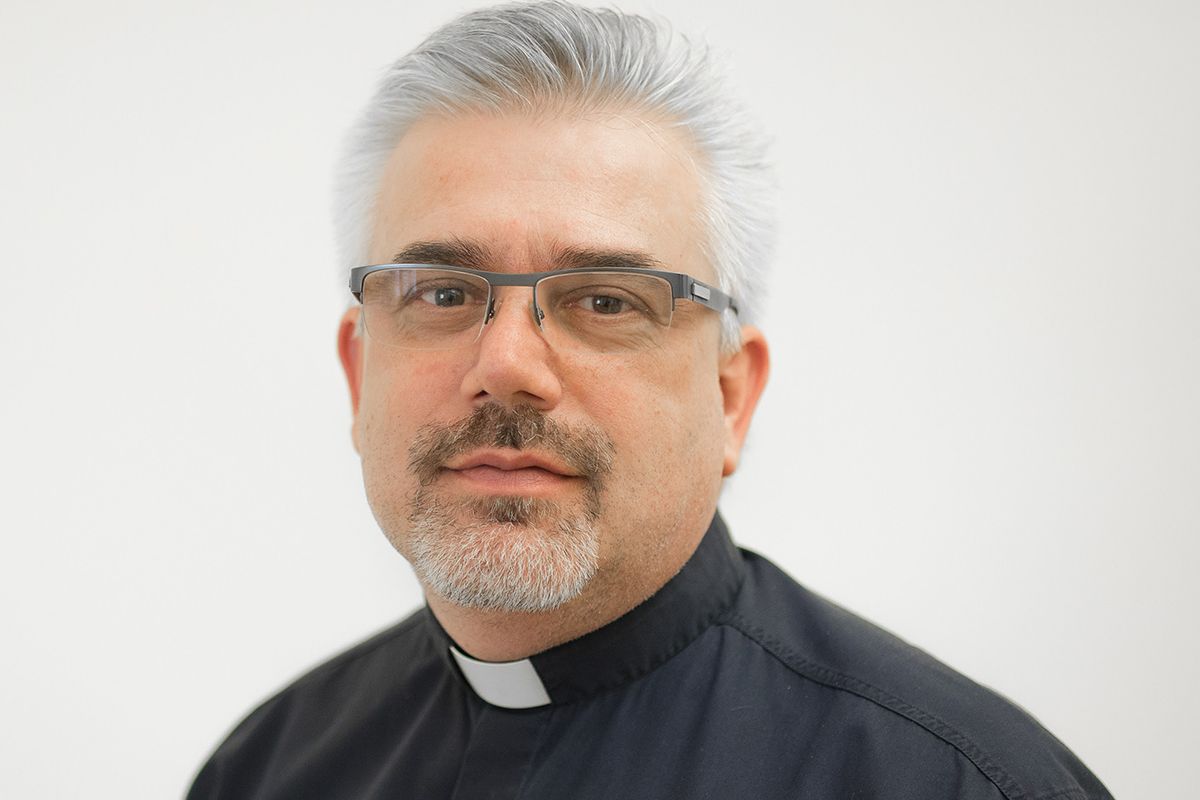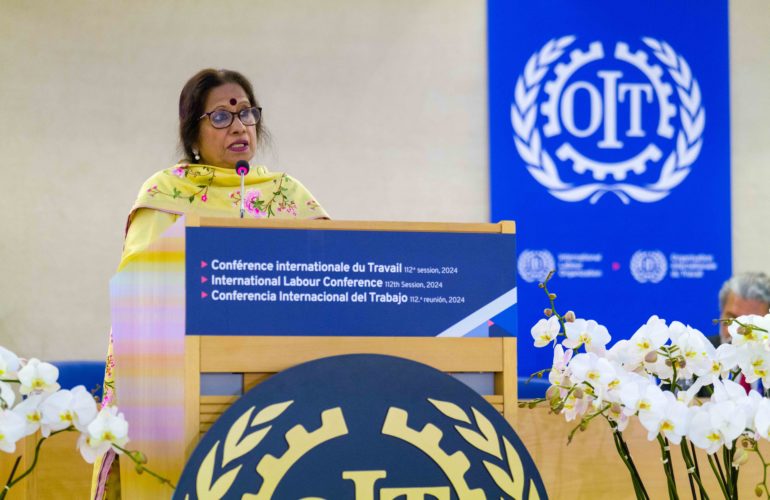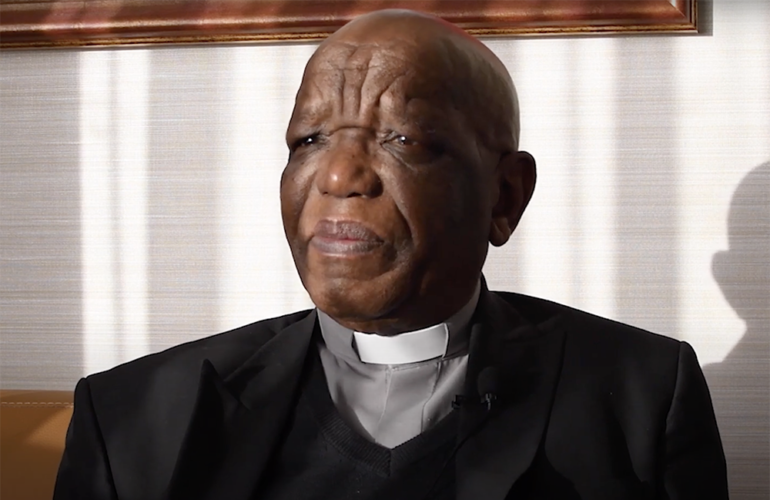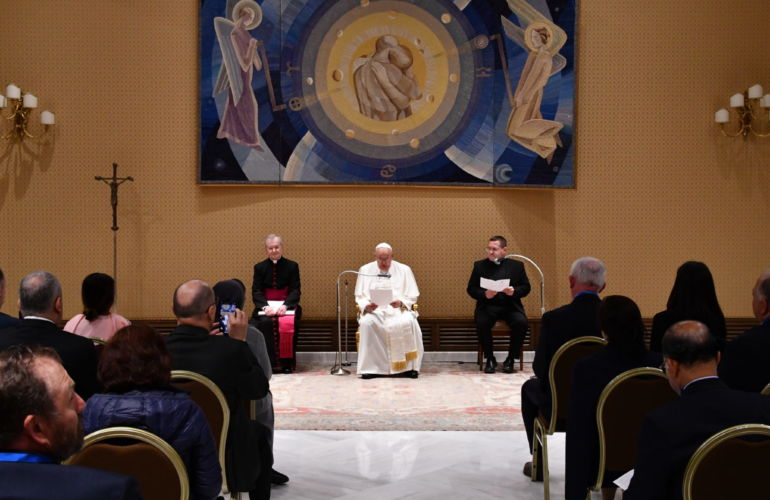At This Change of Era, We Must Care for Our Common Family
The 13th Global Forum on Migration and Development Summit, hosted remotely by the United Arab Emirates, is taking place from 18 to 26 January. It brings together national and local governments, civil society actors, business leaders, and youth representatives. Father Fabio Baggio, Under-Secretary of the Migrants and Refugees Section, is part of the Holy See’s delegation to the Summit. In this conversation with ICMC Communications, he discusses the Holy See’s expectations for this year’s sessions and the new challenges and opportunities the COVID-19 pandemic presents to migration governance.

ICMC Communications: What are the Migrants and Refugees Section’s expectations for this year’s Global Forum on Migration and Development Summit? What would you like to see in terms of outcomes?
Fr. Fabio Baggio: The Migrants and Refugees (M&R) Section has participated in every convening of the Global Forum on Migration and Development in the past four years, taking part in the official delegation of the Holy See. Every time, we try to understand how the different themes, selected among the many themes that could be part of a discussion, can help the global governance of migration. The idea of a global forum is to give a space for different actors concerned about issues regarding migrants, refugees, and asylum-seekers. They look at migration and development as a complicated nexus to understand how reflecting on the selected themes can help coordination between the different actors.
The Holy See participated proactively in the negotiations and consultations that gave birth in 2018 to the two Global Compacts, one on migrants and one on refugees. Now, it is time to put them into practice. A good portion of the Global Compact for Safe, Orderly and Regular Migration entails development as one of the key issues. The M&R Section would like to promote the dialogue among the different actors on the migration and development nexus as part of their common concern or common goal for the future of migration.
Are there specific themes or topics that the M&R Section is interested in at this year’s Summit?
In this edition, the question of the impact of COVID-19 is evident in the titles of all the Global Forum’s working sessions. We saw the concern raised by many actors about the pandemic crisis’ negative impacts, particularly regarding the condition in which migrant workers found themselves. In the past ten months. The M&R Section has been receiving several reports regarding migrants during this time of pandemic from grassroot organizations. We have been informed about the loss of migrants’ jobs, the obligation to return to their country of origin, often unassisted, and their exclusion from the general assistance provided in some countries. This is one of our concerns.
Another concern is that when there is an emergency involving people’s health, all other emergencies seem to be put second in line. This is where we would like to repeat what Pope Francis said during his wonderful prayer for Easter 2020: “This is not a time for forgetfulness. The crisis we are facing should not make us forget the many other crises that bring suffering to so many people.”.”
Even now, the very crucial concerns about the vaccine’s distribution and access to it should be considered from this perspective. The most vulnerable – and among them there are many migrants and refugees – might be excluded or put in the last place.
In light of the COVID-19 pandemic’s effects on migrants and refugees, what does the M&R Section hope will be made a priority in the implementation of the Global Compact for Migration?
The M&R Section joined the Vatican COVID-19 Commission, which Pope Francis created ad hoc. It aims to collect information about the grassroots needs of local communities around the world to produce reflection on the facts, on the evidence, thinking about the future. This building of the future has also been part of the M&R Section over the past months. We reflect on a scenario that leads to a new fraternity, a new social friendship assured and promoted everywhere in the world, according to what Pope Francis has described many times and summarized in the Encyclical letter “Fratelli tutti”.
This document clearly explains the dreams that Pope Francis would like to dream together with many others; one family working together for the future with no one left behind, no one excluded; growing together, saving ourselves together. This is also the M&R Section’s concern as we support multilateral dialogue, not only at the Global Forum on Migration and Development but also in other arenas.
There are opportunities to bring issues to the table and to discuss together with other relevant experts how to better implement the Global Compact. There are several questions regarding the health of migrants, their security and their rights, including their right to health and their access to health systems. The idea is to reach a more just world where access to integral human development is provided to all.
When we talk about the Global Forum on Migration and Development, we talk about partnerships between governments, civil society organizations, and the private sector. What would you say is the specific place of civil society organizations, and why is it essential to include them? As we advance with the implementation of the Global Compact, what role do civil society organizations have?
I personally started to connect with the Global Forum on Migration and Development during its second edition, in the Philippines in 2008. I was part of the organizing committee for the Civil Society Days. I have been following all the processes since then. I have been very pleased to see that other actors decided to be part of the Forum over the years. I always understood the Global Forum on Migration and Development as a very special space for dialogue for those concerned about migration and the future of labor migration. So the idea is to have a space that can be widened to those willing to join the discussion. In the past, we used to have government days and Civil Society Days. Then we saw them come together. Now, we also have the private sector, the Youth Forum, and the Mayoral Forum as mechanisms that provide inputs and engage in the dialogue.
Why is it important to include them? Of course, civil society organizations have always been very proactive in advocating for migrants’ rights. I was part of the civil society group in 2017 and can attest that thanks to them, several issues connected to migrants’ dignity and human rights were included in the discussions.
At the same time, we also see how the private sector recognizes a certain responsibility and foresees possible investment in development through the nexus with migration, migrant communities, and the diaspora. The private sector can contribute many ideas and has been able to initiate a lot of good practices.
We also have the youth leadership. It is very important because we are thinking about the future and we have to engage with the main actors of the future, the youth. They should be aware, knowledgeable of issues and take their corresponding leadership positions.
As for the Mayoral Forum, we realize that migrants usually live in cities for extended periods, sometimes permanently. Cities and local policies are instrumental to integration. Generally, mayors, councilors, and local government agencies are among the main actors of migrants’ integration, helping them to find a job and a house, and promoting all the different processes essential towards their inclusion in the receiving societies.
As societies look to rebuild their economies after COVID-19, which aspects of the Catholic Social Teaching should they look towards for inspiration?
Pope Francis has been quite outspoken in the catechesis that he delivered in September and October. The Vatican COVID-19 Commission has also been producing some reflections. It has been shown with evidence that the system that is ruling today’s economy is not the just and the right system to create fair and inclusive development for all. This means that we have an opportunity today. Of course, we are not leaving aside all the considerations regarding the negative impacts of COVID-19. But if, as is the case, we have to find the opportunities that the pandemic crisis has given us, it is clear proof that the system is not working.
We have an opportunity to “reboot,” to change the system today. The Vatican Covid-19 Commission has drafted several concrete proposals. I would like to invite people to read the different reflections posted on the Vatican COVID-19 Commission website. We have a group of expert economists who reflected on what kind of communal, inclusive and sustainable economy can be proposed. We must understand that everything is strongly interconnected with the care that we should have for our common home and our common family. I would say that even looking at the economy of the coming years, we should be directly concerned about the care of our common home. There is no economy if we are going to destroy the world which has been entrusted to us, whose administration has been entrusted to us by God Himself.
Why is the International Catholic Migration Commission’s role as a co-convener and facilitator of civil society voices in the Global Forum on Migration and Development important?
I always understood ICMC’s involvement in the Civil Society Days as a very important space which makes ICMC’s good work visible and allows the organization to share the advocacy capacity which it has built up over the past year. When the main responsibility as a co-convener for civil society was given to ICMC, I was very happy. But I also think that it’s a huge responsibility which entails strong engagement with the grassroots. Fortunately, ICMC can rely on an operative presence in different parts of the world. Being a convener is also a commitment to give good examples, implementing what has been recommended in the different GFMD sessions. And so, ICMC is called to share the good practices it has put in place.
Finally, is there a message you would like to send during this Global Forum on Migration and Development Summit upon which we have not touched?
When we start a process like the Global Forum on Migration and Development, there is a temptation to reduce all the outputs to theoretical recommendations. It may have been “a very good dialogue”, but at the end, everyone will go home and just continue doing as they did before. This should not be! I’m hopeful that the concerns and recommendations that we share today will influence how we work and the actions we will take together in the future.
As Pope Francis said, “what we are experiencing is not simply an epoch of changes, but an epochal change.” All our dialogues should underline the changes to be made. The future of migration is linked to the future of the economy. It is linked to the future of the common home and family. Everything is interconnected. We have to learn to dialogue more and we have to learn to act together.
This interview was edited for clarity and conciseness.



